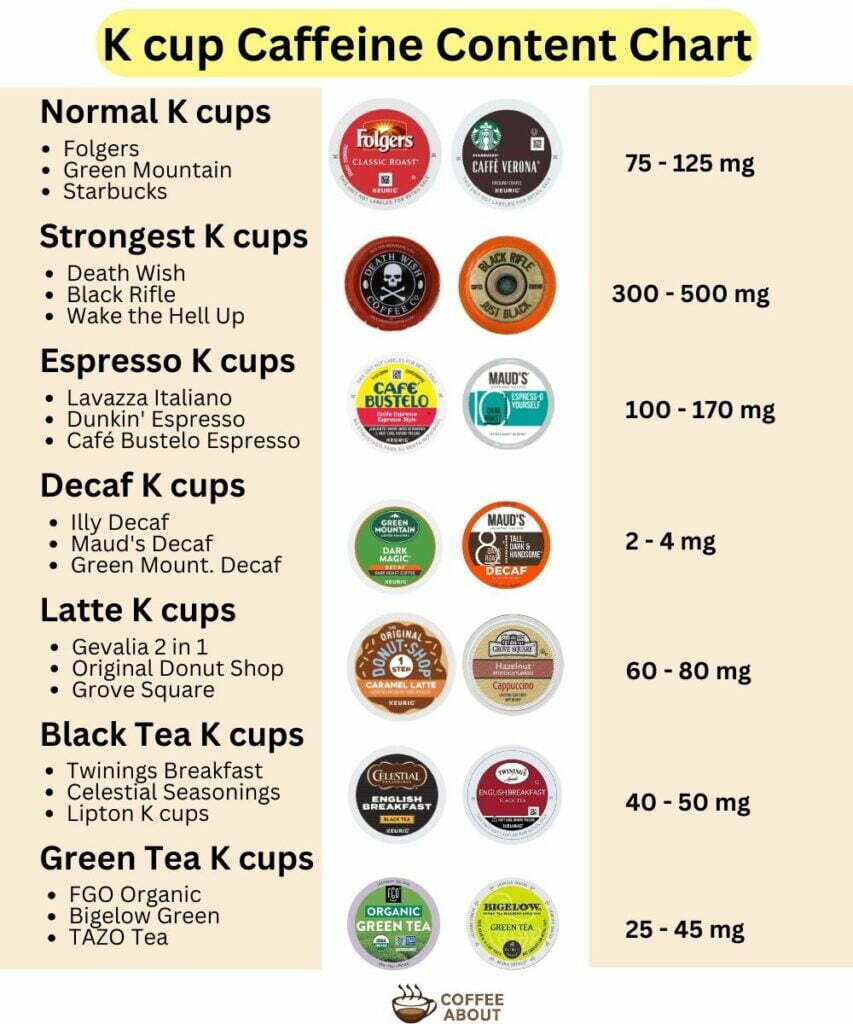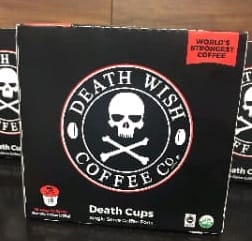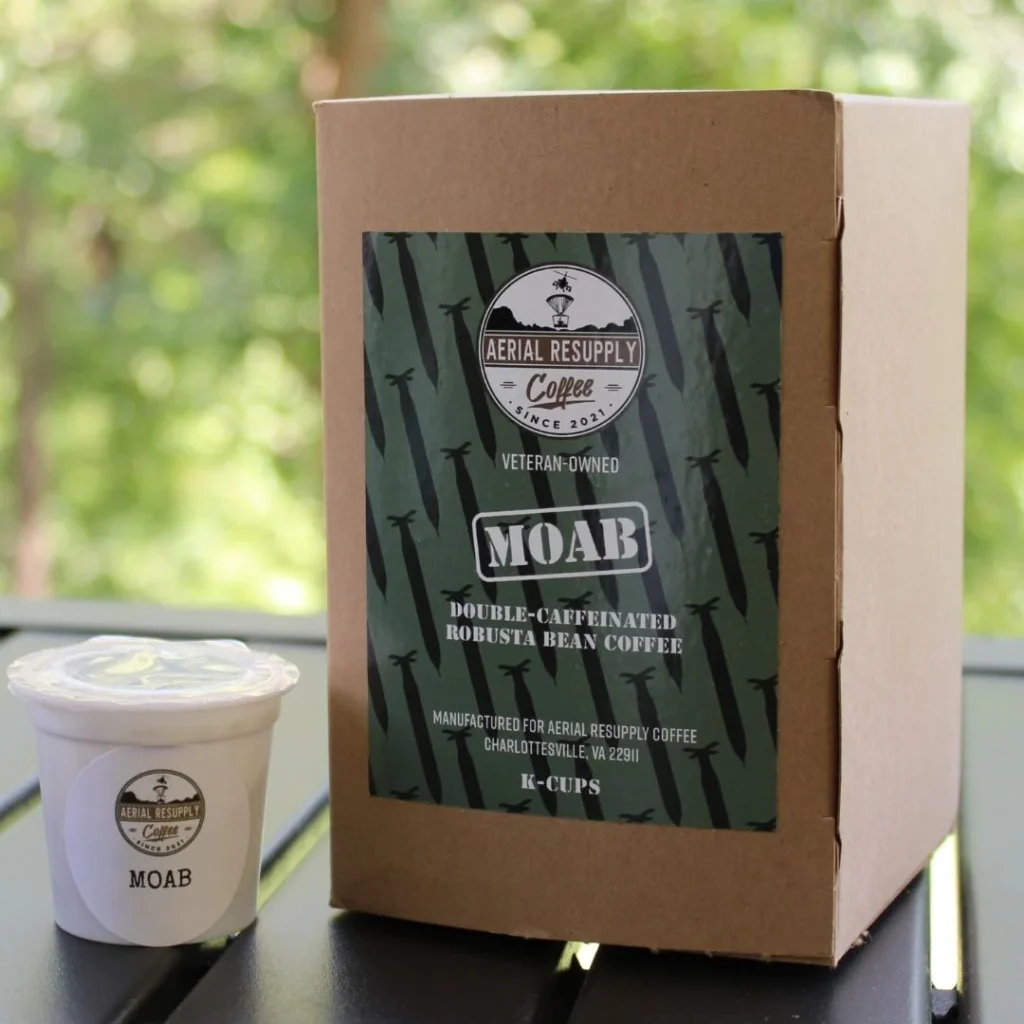How much caffeine do you think is packed into those convenient K-Cups? I admit it’s a bit of a puzzle since different brands and blends offer varying levels of caffeine.
But here’s the scoop: depending on the type of beans, a standard cup of coffee made with a normal K-Cup has 75 to 150 mg of caffeine.
Here’s a quick K-cup caffeine content chart for all different types of pods!

As an Amazon Associate, I earn commission from qualifying purchases.
How much Caffeine in a K-Cup?
K-Cup Coffee pods typically contain between 75 and 150 mg of caffeine per 8 oz cup (250 ml). The caffeine content in a K-Cup can vary depending on the type of coffee beans, roast level, and the amount of coffee in the pod. The amount of caffeine in K-cup Coffee is almost the same as regular coffee brewed through drip brewing methods.
Robusta coffee beans generally have more caffeine than Arabica beans, so coffee pods made with a blend of Robusta and Arabica beans will have more caffeine.
Arabica coffee beans, known for their smooth flavors and enticing aroma, contain slightly less caffeine (8-10 mg/g), while Robusta coffee beans, which have a bitter taste and are often used in coffee blends for their higher caffeine content, contain around 18-20 mg/g.
Here is the caffeine content in various K-cup beverages per 8 oz serving:
| Beverage | Caffeine Content |
| Regular Coffee | 75-150 mg |
| Decaffeinated Coffee | 2-4 mg |
| Espresso K cups | 100 – 170 mg |
| Herbal Tea | 0 mg |
| Green Tea | 25-45 mg |
| Black Tea | 40-50 mg |
| Specialty Beverages (Latte, Cappuccino) | 60 – 80 mg |
How many coffee grounds are in a K-Cup?
There are usually 9 to 12 grams (0.3 to 0.4 ounces) of medium-sized coffee grounds in a K-Cup. This translates to approximately 1.5 to 2 tablespoons of coffee. The specific amount can vary depending on the brand and roast level.
Darker roasts, for example, may have slightly more dry matter in terms of volume and weight.
Many Coffee lovers argue that the amount of coffee in K-Cups produces a weaker brew. Especially when using larger brew sizes.
The best coffee-to-water ratio for a delicious cup of coffee is around 1:15 to 1:17. That means the amount of coffee in a K cup is only good for preparing 5 to 7 ounces of coffee.
That’s why I always recommend choosing a 6 oz brew size for a flavorful and strong cup of Keurig coffee.
Does roast affect the caffeine content in a K-Cup?
While lighter roasts contain slightly more caffeine than darker roasts, generally the roast level doesn’t have a significant impact on the caffeine content of a K-Cup.
Caffeine content is not affected by typical roasting temperatures, and even the darkest roasts rarely reach temperatures that would alter caffeine content significantly during the roasting process.
While roasting does not impact caffeine levels, it does influence other physical properties of the coffee, such as its size and weight. As coffee beans roast, they lose moisture and expand in size.
Dark roasts have less caffeine due to the fact that the beans expand when roasted. So volumetrically they will have less caffeine; however, when comparing light and dark roasts by weight, the caffeine is almost equal.
Read a Guide on Light vs Dark roast Coffee
Does Keurig cup size affect caffeine?
No, the Keurig cup size does not affect the amount of caffeine in the drink. Whether you choose a 6 oz, 8 oz, or 10 oz cup size, the caffeine content remains the same. However, the smaller cup sizes will obviously be more concentrated in caffeine.
This is because the Keurig pod contains a pre-measured amount of coffee that determines the caffeine content, regardless of the volume of water used for brewing.
There can be slightly more caffeine in larger cup sizes due to the extended brewing time. (But obviously, they will be weaker and less concentrated)
Some Keurig models come with a strong button that slows down the brewing process and extracts more flavor from the grounds, resulting in slightly more caffeine in your cup.
K-Cups with the most caffeine content
If you’re seeking an extra jolt of caffeine, these K cup Coffee pods have the most caffeine.
Death Wish Coffee
Death Wish Coffee K-Cup contains the most caffeine, approximately 300 to 400 milligrams per 8-ounce cup of coffee.
I’ve tried a lot of K-cup coffees, but Death Wish Coffee stands out as the strongest one I’ve ever tasted. These special pods can actually make a strong and bold cup of coffee, and I’m impressed by the results.
It offers a perfect dark roasted blend of Arabica and Robusta coffee beans from around the World and delivers an intense flavor profile, with hints of cherry and chocolate.
If you are in search of the strongest K-cup coffee pods you’ll surely love it.

Black Rifle K cups
Black Rifle’s “Caf K cups” pack a punch with around 250-350 mg of caffeine per cup, which is nearly double the caffeine in regular K cups.
The best thing about Black Rifle K cup is their use of 100% Arabica beans sourced from Colombia and Brazil, offering decent taste with no pronounced bitterness. It’s a classic medium roast with a smooth, smoky maple flavor and notes of milk chocolate.

Aerial Resupply Moab Double Caffeinated K cups
Moab – The mother of all brews is an extra caffeinated blend from Aerial Resupply Coffee.
This is a blend of 100% Robusta Coffee which is naturally more caffeinated than Arabica Coffee.

Check out the K cup collection from Aerial Resupply
Check out the list of my favorite High Caffeine K cups
K-Cups with no caffeine | Decaffeinated pods
It’s important to note that even though the decaffeinated k cups are marketed as “no caffeine K cups” they still contain a trace amount of caffeine.
The international standard for decaffeinated coffee requires that 97% of caffeine must be removed from the beans
So decaf coffee pods generally have 2 to 4 mg of caffeine in a normal 8 oz serving of coffee.
Here are some of the best decaf K cup pods.
VitaCup Organic Perfect Dark Roast Decaf
VitaCup’s Organic Perfect Dark Roast Decaf pods are perfect option for coffee lovers suffering with acid reflux or indigestion issues yet unwilling to give up their daily brew. One smooth sip of the chocolatey, nutty notes and you’ll be amazed it’s gentle on sensitive stomachs.
Peet’s Coffee Decaf House Blend
Peet’s Dark Roast Decaf House Blend offers a complex, chocolatey flavor reminiscent of quality caffeinated dark roast. Unlike watery decafs that fall flat, Peet’s dark roast maintains satisfying depth and boldness even without the caffeine.
I find it pairs particularly well with a splash of milk or creamer, adding a touch of sweetness that complements the cocoa notes perfectly.
Check out my favorite Decaf K cup coffee pods
How much caffeine is in Starbucks K-Cups?
On average, a Starbucks K-Cup contains approximately 100 to 130 milligrams of caffeine per 8-ounce cup of coffee. Starbucks also offers “2 X Coffee pods” that have twice the amount of caffeine (around 250 to 260 mg) than normal K cups.
Starbucks offers a range of K-cup coffee pods with varying roasts and flavors, including light roasts like Veranda Blend, medium roasts like Breakfast Blend and Pike Place, and dark roasts like Caffe Verona and French Roast.
Additionally, they also have special offerings like Holiday Blend and flavored options such as Cinnamon Dolce.
How much caffeine is in Folgers K-Cups?
On average, a Folgers K-Cup contains approximately 75 to 120 milligrams of caffeine per 8-ounce cup of coffee. Folgers offers a variety of K-cup flavors and blends with different amounts of caffeine.
Folgers also offers half-caffeinated or completely decaffeinated K-cup pods for those who enjoy the flavor of coffee but want to avoid caffeine altogether.
Final Thoughts
And that’s the scoop on K-cup caffeine content!
Whether you’re a fan of the bold and strong or prefer a milder, gentle wake-up call, there’s a K-Cup out there to fulfill your caffeine needs.
Got any other questions about that caffeine kick from your K cups? Let me know in the comments! I’d love to hear how you take your coffee and your favorite K cup blends.
Check out best K cups for Latte and Cappuccino
FAQs
Do K-Cups Have more caffeine than regular coffee?
K-Cups don’t inherently have more caffeine than regular brewed coffee.
The amount of caffeine in your coffee mostly depends on factors like the type of coffee, the amount of coffee grounds, and the serving size.
How much caffeine should you have in a day?
The recommended daily caffeine intake for most healthy adults is around 400 mg. Individual tolerances to caffeine may vary, and it’s essential to listen to your body and consult a healthcare professional if needed.
Can you use K-Cups twice?
It’s not recommended to use K-Cups more than once. Reusing a K-Cup can result in a weak and diluted cup of coffee with a pronounced plastic taste, as the k cups are made for a single extraction.
If you are going to do it learn how to reuse K cup properly
Does K-cup coffee have calories?
Straight black coffee from a K-cup has very low calories, usually less than 5 calories per serving.
Flavored K-cups contain some calories, typically 25-50 calories per cup. This is because flavored varieties like vanilla, caramel, and hazelnut have added sugars and creamers.
Related article:




Love the caffeine chart breakdown by pod. I am Surprised by the high caffeine in Death Wish! Would try it soon
Oh yeah, Death Wish is real hard! Let me know how it goes if you try it. Just maybe not before bedtime, haha!
Super helpful info! I had no idea caffeine content varied so much between K-cup flavors and brands. This guide makes it easy to choose the right pod
Glad you find it helpful! Yeah, caffeine levels can really vary—good to know before you brew.
My coworker brought in these extra strong Death wish K cups last week. One cup and I was wired for hours!
They literally have huge amount of caffeine compared to normal K cups. Maybe good for an all-nighter but too intense for my daily use.
Yeah death wish do give a serious caffeine buzz!
I’m surprised at how much the caffeine levels vary between different brands and pods. Now I know why Death wish give me caffeine jitters!
Some coffee drinkers argue that K-Cups produce a weaker cup of coffee compared to traditional brewing methods. Is the convenience of K-Cups worth sacrificing the strength and flavor of coffee?
I was so happy to see the chart and all the information on caffeine found in the various types of coffee. After receiving a warning from my doctor to cut caffeine, I had no idea how to manage this. Coffee packages provide no information on caffeine content! Thanks to your chart, I can now calculate acceptable daily amounts. Your help was much appreciated!
I am Glad that it helped you, Lorna!